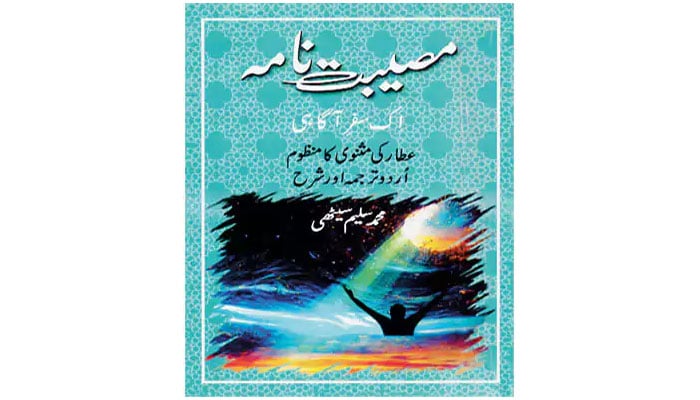Islamabad : Former Federal Secretary and a well-known man of letters, Muhammad Saleem Sethi has come up with a genuinely-crafted literary landmark, the Urdu translation and illustration of the famous Persian poet Fariduddin Attar’s long poem ‘Musibat Nama.’
The book gives a deep insight into the Sufis’ school of ‘Ishq’ which is commonly known as ‘Mysticism.’ It takes the readers to the less-trodden paths of human sufferings and man’s resilience in the face of ordeals. An undertone of curiosity always keeps the flame of spiritualism burning, says a press release.
In the interior parts of old Peshawar city, the Persian ‘kalam’ of Sheikh Saadi and Attar of Nishapur was read out and the family members used to sit silently and listen to the resonating Persian verses of great Iranian poets. It was that rich literary background that made Saleem Sethi undertake the gigantic task of translating Attar.
Persian was a household language and carrying forward the rich literary legacy of his father Muhammad Yousans Sethi Wafa who was a well-known poet and considered an authority on Maulana Rumi, Saleem Sethi took up the works of Rumi and Attar for translation into Urdu. Before ‘Musibata Nama’ he translated Attar’s ‘Mantiq-ut-Tair’ or ‘The Conference of the Birds’ and it earned him a worldwide reputation as an accomplished translator of Persian poets.
Sethi owes the recent translation to his parents Muhammad Younas Sethi Wafa and Farida Sethi, his wife Nargis Sethi and daughters Gulmeenay and Palwasha for completing the seemingly impossible task. Their prayers, support and assistance have been quite instrumental in completing the work. He doesn’t forget to mention Pakistan’s celebrated story writer Pride of Performance recipient Mazharul Islam who helped him in publishing the 408-page book by the renowned publication house Sang-e-Meel.
According to literary critics and readers it is a matter of great satisfaction that the Urdu translation of ‘Musibat Nama’ is now available at the bookstalls of Rawalpindi and Islamabad. The poetic translation is equally appealing and revealing as the original book is, they said adding the simple diction and flow of thought keeps readers engrossed from the first page to the last.
Fariduddin Attar was an Iranian poet, born around 1140 in Nishapur. His real name was Abu Hamid bin Abu Bakr Ibrahim. His father was a chemist. After growing up Attar adopted the same profession. He also excelled in physiology. However, his life took a complete turn when one day a saintly figure chanced to appear before his clinic. He called Attar. On Attar’s persistent ignoring, the saint said to him, “You are occupied with your business. How will you have time to die?” This angered the young Abu Hamid and he shot back, “I will die just like you.” Hearing this, the saint calmly lay down, made his begging bowl his pillow, took his blanket over him and peacefully passed away. The incident had a lasting impact on 37-year old Attar and he quit his business then and there. He gave away all the worldly wealth in charity and left in search of truth, wisdom and peace. He started writing under the pen name of Fariduddin Attar. His representative works include: ‘The Conference of the Birds,’ ‘The Book of Divine,’ and ‘Memorial of the Saints.’
In the Mongol attack not only Iran’s libraries and bookstores were set on fire, scholars and poets were also killed and Attar was one of those who were murdered by the Mongols in 1221.
-
‘Pakistan-Qatar trade ties to benefit both countries’
Islamabad Chamber of Commerce and Industry President Ahsan Zafar Bakhtawari presents a souvenir to Ambassador of...
-
CDA increases water supply
Chairman of the Capital Development Authority Chaudhry Muhammad Ali Randhawa chairs a meeting on May 6, 2024. —...
-
Stakeholders call for regulation of trans-fatty acids in foods
This representational image shows a burger and chips. — Unsplash/FileIslamabad:The Transform Pakistan campaign...
-
Educational session at Kauthar College for Women
This collage of images shows, Dr. Shaukat Hameed Khan, former Member Planning Commission and renowned professor of...
-
Govt urged to develop guidelines for respectful language referencing PWDs
This image shows the logo of the Centre for Peace and Development Initiatives . — APP/FileIslamabad:The Centre for...
-
Significant drop in smoking rates in Pakistan
This representational image shows a man smoking. — AFP/FileIslamabad: A recent survey by Islamabad’s Centre for...
-
 Ben Affleck 'prioritises' Jennifer Garner's Family Over JLO’s Movie Premiere
Ben Affleck 'prioritises' Jennifer Garner's Family Over JLO’s Movie Premiere -
 Heatwave: Summer Vacation Schedule Changed For Sindh Schools?
Heatwave: Summer Vacation Schedule Changed For Sindh Schools? -
 These Chrome Extensions Are Slowing Down Your Web Browser Most
These Chrome Extensions Are Slowing Down Your Web Browser Most -
 Kate Middleton Shares Important Message As Cancer Battle Continues
Kate Middleton Shares Important Message As Cancer Battle Continues -
 Taylor Swift Makes Travis Kelce's Life 'difficult' With Irrational Demand
Taylor Swift Makes Travis Kelce's Life 'difficult' With Irrational Demand -
 Oleksandr Usyk To Lose World Heavyweight Title Just Days After Tyson Fury Win
Oleksandr Usyk To Lose World Heavyweight Title Just Days After Tyson Fury Win -
 THIS Closest Ally Of Donald Trump Stole Millions From His Business
THIS Closest Ally Of Donald Trump Stole Millions From His Business -
 Shannen Doherty ‘regrets’ Not Making It To ‘Charmed’ Finale
Shannen Doherty ‘regrets’ Not Making It To ‘Charmed’ Finale
